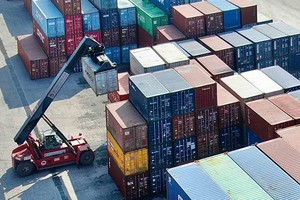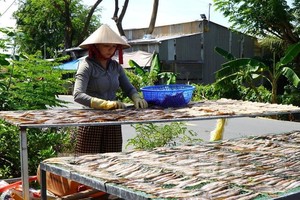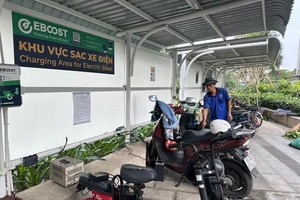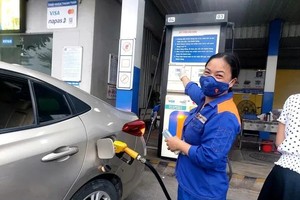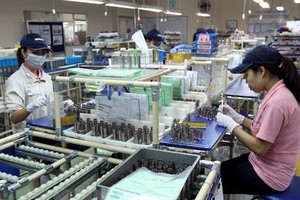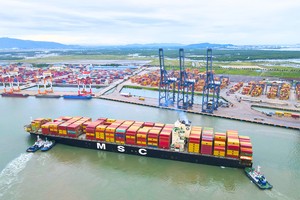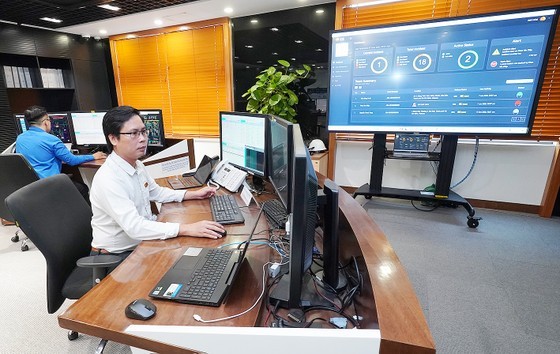 |
The power control center at Ho Chi Minh City Power Corporation. |
These days, the "National Digital Transformation Day" event is occurring nationwide. Prime Minister Pham Minh Chinh confirms that digital transformation is an unavoidable trend, taking place robustly and extensively not only within Vietnam but also globally.
Numerous documents and resolutions of the Party have highlighted and firmly established digital transformation, the digital society, and the digital economy as key objectives and perspectives of the country's sustainable development. Vietnam not only focuses on advancing the digital economy but also actively pursuing various other innovative economic models, including the green economy and the circular economy, as integral solutions for the nation's progress.
On March 31, 2022, the Prime Minister issued Decision 411/QD-TTg, approving the National Strategy for Digital and Socioeconomic Development until 2025, with a vision extending to 2030. The strategy is aimed at achieving a digital economy's contribution of 20 percent to the GDP by 2025 and 30 percent by 2030.
This includes a minimum digital economy contribution of 10 percent in each sector and industry, e-commerce accounting for over 10 percent of total retail, over 80 percent of businesses using electronic contracts, and over 50 percent of small and medium-sized enterprises (SMEs) utilizing digital platforms. These objectives align with Vietnam's goal of surpassing the low average income threshold by 2025, reaching a high average income level by 2030, and achieving a high income level by 2045.
Before that, on October 1, 2021, the Prime Minister issued Decision 1658/QD-TTg, endorsing the National Strategy for Green Growth for the 2012-2030 period, with a vision to 2050. The primary aim of this decision is to drive economic restructuring in alignment with progressive growth models, striving for a green economy, carbon neutrality, and active participation in the endeavor to combat global warming.
On June 7, 2022, the Prime Minister issued Decision 687/QD-TTg, approving the Circular Economy Development Plan in Vietnam, to create momentum for innovation, promoting sustainable growth by utilizing resources more efficiently, contributing to environmental protection, and fostering collaboration among businesses.
Although the direction is quite clear, and in practice, all three of these new economic models have emerged and are becoming more prominent in Vietnam, the legal framework and conditions for their operation and development are still lacking. For instance, in the realm of e-commerce, there are still numerous regulatory gaps concerning counterfeit prevention, consumer protection, and tax evasion prevention.
In the realm of transportation business management, according to regulations, most vehicles have already been equipped with tracking devices. However, government agencies responsible for processing information from these devices operate at a slow pace. One of the reasons for this is the fragmented, decentralized database lacking integration and synchronization.
Green economy has become and continues to be an urgent demand for Vietnam, especially as many traditional export markets for Vietnamese goods continuously impose trade barriers related to environmental protection. However, numerous regulations regarding credit support for green projects are unavailable. Many banks have expressed their readiness to offer preferential policies for green projects, but they face difficulties in determining what qualifies as a green project due to the absence of specific guidelines.
The same situation applies to the circular economy. The 2020 Environmental Protection Law mandates waste sorting at its source but does not offer explicit guidance on how waste should be transported and recycled after sorting. This lack of specificity is the main factor hindering the efficient implementation of recycling activities in many regions.
Agricultural byproducts in Vietnam are abundant; however, a substantial portion of them remains unused as raw materials for various other industries. According to statistics from the Ministry of Agriculture and Rural Development, Vietnam has approximately 5-6 million households and 23,500 livestock and poultry farms, generating an annual average of 84.5 million tons of waste.
Regrettably, only 20 percent of this waste undergoes proper processing through composting, bioenergy production, or use for earthworm breeding purposes, while the remainder is discharged into the environment. This is primarily due to the absence of incentivizing mechanisms and specific legal regulations for the efficient utilization of agricultural byproducts and waste.
The swift establishment of a robust legal framework and the facilitation of favorable conditions for the functioning of these economic models are the suggestions put forward by the business community in numerous forums.
On Vietnamese Entrepreneurs' Day, this issue is being reiterated with the hope of adding more voices to expedite this process.
Lawyer CHAU VIET BAC, Deputy Secretary General of the Vietnam International Arbitration Center (VIAC): Businesses need to be proactive
Apart from external uncertainties like disease outbreaks and conflicts, the adjustments in policies and the legal framework are introducing new variables that demand enterprises to be well-prepared in terms of planning and strategy.
From this standpoint, I firmly believe that a legal approach is one of the most critical solutions for effective business management and development. In this context, policies and regulations must undergo reforms to become more business-friendly, and companies themselves need to adapt and change promptly to mitigate the impacts and risks arising from objective market conditions.
Building a sturdy "legal armor" is unquestionably one of the crucial elements for the sustainable and efficient growth of businesses. Given the multitude of legal documents undergoing revisions, adjustments, and updates, along with the myriad challenges and risks encountered during contract execution, it is imperative for the business community to have platforms for sharing, as well as to seek professional guidance and support from authorities, organizations, and experts in orientation and solutions.
Mr. NGUYEN KHAC HOANG, Director of the Ho Chi Minh City Statistics Office: Supporting businesses
First and foremost, it is essential to assess the progress in addressing the challenges and issues that businesses have raised in the recent period. This evaluation should cover what has been successfully addressed, identify the outstanding issues that remain unresolved, and pinpoint the root causes to set the direction for resolution in the fourth quarter of 2023 and beyond.
Regarding access to preferential funding, in the first nine months of 2023, the total outstanding credit in the city increased by only 5.9 percent compared to the same period. This indicates that the capacity to absorb capital by businesses is currently quite limited.
Therefore, it is necessary to create even more favorable conditions for businesses to access loans and preferential credit for key economic sectors and SMEs. It is also important to allow domestic banks to purchase bonds nearing maturity, treating them as a form of special credit, and establish mechanisms for businesses to participate in unsecured guarantees for workers.
Ms. NGUYEN NGOC HUONG, Director of Thien Nhien Viet Import-Export Company Limited: Consistent preferential policies
Our company specializes in the production of various freeze-dried agricultural powders, including Asiatic pennywort, fish mint, perilla mint, and various herb powders. These products are primarily exported to the EU market.
The agricultural sector demands significant investments and a considerable amount of time but generates relatively low profits. It is also susceptible to various risks, such as saltwater intrusion and natural disasters. As a result, businesses in this sector require favorable treatment in terms of policies, mechanisms, and appropriate financing, particularly in the post-Covid-19 period. Many businesses are currently grappling with a range of challenges related to market and financial issues.










